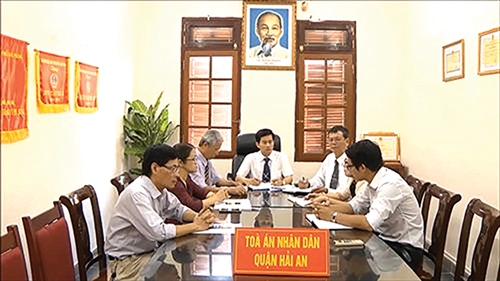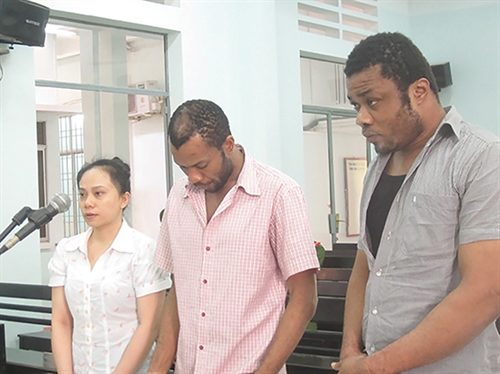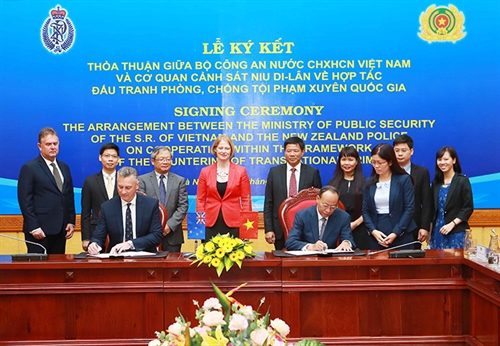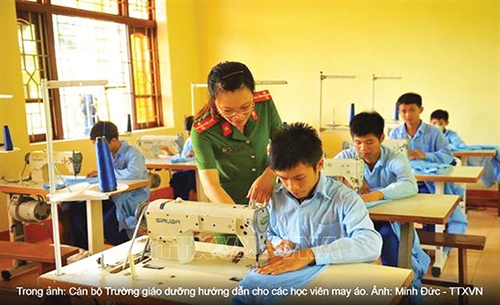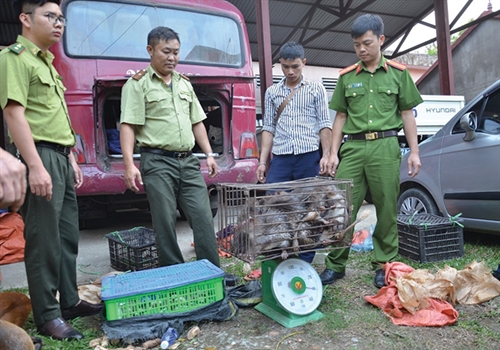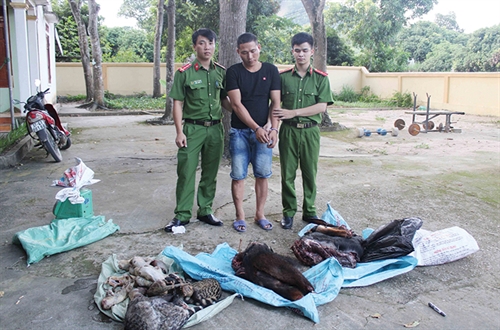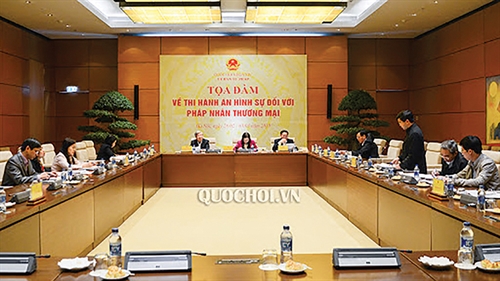The article first reviews the United Nations Convention against Corruption (the UNCAC) in terms of criminalization of corruption. It then criticizes limitations and inadequacies of the 1999 Penal Code of Vietnam regarding corruption crimes in comparison with standards set by the UNCAC. The article continues to present and analyze the 2015 Penal Code (the Code) regarding criminalization of corruption in the light of the UNCAC to examine whether Vietnam’s criminal law is fully in conformity with international obligations. Although the Code has been made with considerable amendments concerning the matter, the author finally finds out incompatible provisions, including unclear description of elements of corruption in the non-state sectors, bribery of foreign public officials, and lack of criminal corporate liability for the offense of giving bribe.
Dao Le Thu[1]
Setting the scene
The world nowadays has to confront serious problems and threats posed by corruption. Corruption is a high-profile issue of most countries, developed and developing, and Vietnam has not been excluded. That’s the reason why Vietnam has been engaging in activities that show a determination to combat and control corruption, including participating in anti-corruption conventions. As Vietnam signed (on December 10, 2003) and ratified (on August 19, 2009) the United Nations Convention against Corruption (the UNCAC or the Convention), it is highly relevant that the article examines Vietnam’s criminal law on corruption in the light of the Convention. The UNCAC in criminalization perspective affirms that:
“The Convention goes on to require the State Parties to introduce criminal and other offenses to cover a wide range of acts of corruption, to the extent these are not already defined as such under domestic law. The criminalization of some acts is mandatory under the Convention, which also requires that State Parties consider the establishment of additional offenses. An innovation of the Convention against Corruption is that it addresses not only basic forms of corruption, such as bribery and the embezzlement of public funds, but also acts carried out in support of corruption, obstruction of justice, trading in influence and the concealment or laundering of the proceeds of corruption. Finally, this part of the Convention also deals with corruption in the private sector.”[2]
The 2015 Penal Code has been adopted with important revisions that criminalize some corrupt acts committed by the so-called “Position-holders or authority-holders” in organizations and corporations of non-state sector. This is the demonstration of an endeavour of a State Party to the UNCAC which recommends criminalization of corruption in the private sector. It further criminalizes bribery of foreign public officials (FPOs for short) based on the current need to prevent such practices and Vietnam’s obligations under the UNCAC. The criminalization of bribery of FPOs resulted from the assessment of the compliance of Vietnam’s criminal law with the UNCAC. In addition, the concept of corruption in the Code is also extended in the way that includes intangible benefits to the scope of bribes.
Before the passage of the Code, Vietnam underwent the process of national self-assessment of UNCAC implementation in 2011 and 2012, which found some important gaps (in the 1999 Penal Code), including the lack of bribery of FPOs and criminal corporate liability, also suggesting areas that need further compliance with UNCAC’s provisions. By the additional criminalization of corruption in the private sector and bribery of FPOs under the Code, these suggestions seem to have been recognized to some extent. This shows Vietnam’s concern about maintaining fair competition in business, ensuring good governance and promoting international cooperation in fighting against corruption.
The article is written in the context of the initial enforcement of the Code. Several amendments to the Code need to be examined for compliance with UNCAC (external purpose) as well as for interpretation and application thereof (internal usage). It checks whether revisions to the Code meet international standards and overcome limitations and gaps that affected effectiveness of the 1999 Penal Code with respect to criminalization of corruption.
The UNCAC from criminalization perspective
The UNCAC first of all reflects the need to criminalize corruption in national criminal laws. It calls for preventive measures and the criminalization of the most prevalent forms of corruption, including active and passive activities, in both public and private sectors. It also sets standards for the criminalization of corruption and obligates the State Parties to establish criminal offenses covering various types of corruption, namely bribery of national public officials (Article 15), bribery of foreign public officials and officials of public international organizations (Article 16), embezzlement, misappropriation or other diversion of property by a public official (Article 17). The State Parties do not have to constitute a different corruption heading for each of these offenses but detailed descriptions of offenses can still be seen as necessary standards for legislation. The UNCAC also recommends the criminalization of some other types of corruption such as trading in influence (Article 18), abuse of functions (Article 19), illicit enrichment (Article 20), bribery in the private sector (Article 21), and embezzlement in the private sector (Article 22). In the light of the Convention, a criminal law on corruption will be comprehensive and adequate if it covers different specific offenses of corruption in any way. A more detailed and specific law may be a more useful instrument in countries where the knowledge of the existence of corruption is still at a low level.
The UNCAC establishes standards on the criminalization of corruption by giving definitions of specific offenses that describe their elements, including objective and subjective ones. The prescription of objective elements refers such typical factors as characteristics of the offender, the actus reus, and the bribe. In terms of the mens rea, intent and purpose are required elements of corruption under the UNCAC.
In regard to the offender, the first actor who commits corruption offenses must be a “public official”. The UNCAC constructs specific, direct and broad definitions of such concepts as “national public official”, “foreign public official” and “official of a public international organization” under Article 2 (a), (b), (c). These mean to include different kinds of corrupt offenders therein. The definition of ‘public official’ in the UNCAC has to be flexible to fit the aim of creating a harmonized standard for identifying the corruptor.
“National public official”, as defined in the UNCAC, is a very broad and general concept. Basically, the concept should include any person who: holds a legislative, executive or administrative office, including heads of state, ministers and their staff; is a member of a domestic public assembly exercising legislative or administrative powers; holds a judicial office, including a prosecutor; performs a public function, including for a public agency; performs a public function for a public enterprise, e.g., executives, managers; performs any activity in the public interest delegated by a signatory; provides a public service as defined in the signatory’s domestic law and as applied in the pertinent area of law of that signatory, e.g., teachers, doctors; meets the definition of a “public official” in the domestic law of the signatory such as minister, mayor, law enforcement officer, and the military.[3] Reviewing the list of persons to be regarded as ‘national public official’, one sees that this frames the concept as broadly as possible. Employees of all kinds and at all levels of national government and anyone exercising a public function for the national government are included in the concept of public official.
The UNCAC specifically defines the term “foreign public official”. The scope of the definition of ‘foreign public official’ includes public officials of foreign countries and officials and agents of public international organizations. Particularly, Article 2(b) prescribes persons holding a legislative, administrative or judicial office or persons exercising a public function for another country or for an international organisation. Thus the ‘key word’ for determining the concept is ‘a public function’. Furthermore, the UNCAC also covers officials, employees and representatives of international organizations.[4] Such organizations include those established by states, governments or other public international or supranational organizations or bodies of which the state party is a member, regardless of their form and the scope of their competence. A “public official” of a public international organization means an international civil servant or any person who is authorized by such an organization to act on its behalf. Once again the concept is defined in a very broad way and is very comprehensive.
Under the UNCAC, the offender of corruption offenses can also be any person, regardless of his/her capacity. For example, the person who commits active bribery or trading in influence can be a public official, a private individual or even a company. This means the persons subject to criminal liability for corruption can be an individual as well as a legal entity. The UNCAC clearly covers the liability of legal persons.[5] As with the usual criminal principle, the liability of a legal person does not in any manner exclude criminal proceedings against relevant natural persons. Consequently, the UNCAC recommends corporate liability to be established under domestic criminal law.
Actus reus is another element of corruption offenses. Corrupt acts vary from active and passive bribery to embezzlement, misappropriation or other diversion of property, trading in influence, abuse of functions, illicit enrichment. The description of the acts is very clear and comprehensive as it fully covers corrupt practices in an understandable way. Active bribery for example is defined as promising, offering or giving an advantage while passive bribery is prescribed as requesting, soliciting, receiving or accepting a bribe.[6]
The bribe is a very important element regarding bribery offenses. According to the UNCAC, the bribe must constitute an ‘undue’ advantage. Thus, not all advantages are prohibited. What does ‘undue’ mean? An advantage is only regarded as undue when it is not foreseen by a legal norm. The determination of lawful or unlawful nature of an advantage is based on the binding legal norm of the State Parties. In general, the spirit of the UNCAC is to make the giving of an advantage regardless of its result and value, local customs, local authorities’ tolerance to such payments and alleged necessity of the payment. In addition, the bribe can be any undue pecuniary or other advantage. It can also be defined as any tangible or intangible benefit. The bribe can be an advantage of any kind. The usual forms of bribe are bank transfers or the payment of cash and transfers of other assets. Bribes are not only of material (tangible) but also immaterial (intangible) benefits, e.g., obtaining a place at a famous school for the official’s child or better career prospects. The arrangement of all kinds of personal favors for the official, whether related to his career or his private life, is covered. The key point is that the offender or the third party is placed in a better condition that he was before the commission of active bribery and that he is not clearly entitled to the advantage given to him. The requirements regarding the nature and form of the bribe set forth under the UNCAC seem both flexible and justifiable from the criminal law perspective.
Concerning subjective elements of corruption, the UNCAC requires intention and purpose to be included in the offenses. In other words, offenses of corruption can only be committed intentionally. For instance, Article 28 of the UNCAC defines “knowledge, intent and purpose as elements of an offense”. Accordingly, the briber and bribee must be aware and have the intention that the bribed official acts or refrains from acting in exercise of his or her duties. The UNCAC goes on to require that ‘intent’ has to relate to all objective elements of the offenses, including the future result of the offense. In terms of bribery for instance the intent must also relate to the briber’s act that is regarded as a consecutive element. For example, the briber does not only want to give the bribe, but also wants the bribed official to act or refrain from acting as required. However, ‘intent’ does not require that the actual action of the bribed official be as intended. In addition, the purpose of influencing the official’s performance of duty is also required as another mental element of bribery offenses. The UNCAC suggests the way to determine these elements “knowledge, intent or purpose required as an element of an offense established in accordance with this Convention may be inferred from objective factual circumstances.”[7]
The UNCAC further address issues concerning specific types of corruption that should be criminalized. The first type approached is bribery of foreign public officials. The UNCAC requires active bribery of foreign public officials or officials of public international organizations be criminalized as offense of bribery.[8] It also recommends the criminalization of passive bribery of foreign public officials. However, it limits such criminalization to the purpose of obtaining or retaining a business transaction. As a result, not all bribery of foreign public officials falls under this Convention but only that involving international business transactions. Transactions concerned can be cross border or foreign trade or transactions with international organizations. Advantages resulting from bribery can be contracts obtained or other improper advantages like investment permits in international sales. Every benefit that is gained through bribery of a foreign public official shall be regarded as an improper advantage. There must be a link between the commission and the objective of the offense.
The UNCAC also extends criminal liability to corruption in the private sector. There are several reasons for the criminalization of corruption in the private sphere. First of all, it helps ensure the maintenance and development of fair social and economic relations. Second, it is necessary to maintain fair competition. Finally, it protects the public from damaging effects of corruption in business, especially corruption of financial and other powers in this field of social life.[9] There are three notable features of corruption in the private sector that can be identified. Firstly, the scope of the fields where private corruption occurs is restricted to the business area. The UNCAC provides three areas where private bribery can occur: economic, financial and commercial activities.[10] Secondly, the offender must be employees in the private sector. The UNCAC specifically provides that actors committing corruption can be persons who direct or work, in any capacity, for private sector entities. The provision therefore covers a large number of people who can become offenders of corruption in the private sector. Thirdly, in contrast to the provisions on bribery in the public sector, the private bribery offense requires an element of breach of duty by the bribee. It appears that the loyalty-based relation between the employee and the principal becomes the key point justifying the improperness of bribery in the private sector.[11]
(to be continued)
